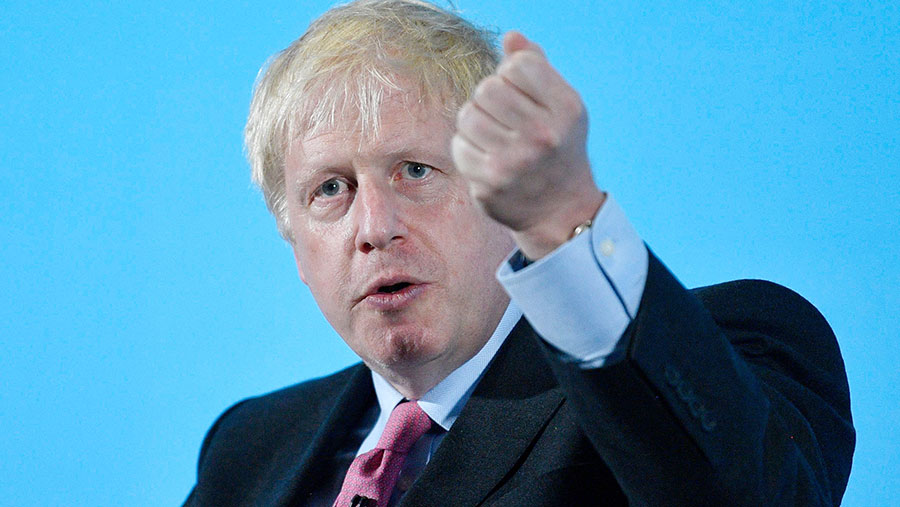Boris Johnson hints at live exports ban if he’s PM
 Boris Johnson © Neil Hall/EPA-EFE/Shutterstock
Boris Johnson © Neil Hall/EPA-EFE/Shutterstock Boris Johnson has hinted he could ban live animal exports after Brexit if he becomes prime minister.
Speaking at a leadership hustings event in Kent on Thursday evening (11 July), Mr Johnson branded the industry a “really terrible business for these animals”, the Huffington Post reported.
Currently, live animals are exported to European Union (EU) countries from the UK for breeding, fattening, and slaughter.
See also: Johnson promises Scots will receive £160m convergence funding
But after Brexit, the UK would be able to tell exporters it is “no longer possible to take live animals in great distress and confusion very, very long distances”, Mr Johnson said.
He added: “Some of them, by the way, go more or less from Scotland to Spain to Africa.”
Mr Johnson told Tory members: “One of the reasons I resigned from the Cabinet is because when you look at the detail of what is implied by the current Withdrawal Agreement, it would make it impossible for us to vary our laws on the live transport of animals.”
A House of Commons briefing report on live animal exports, published last month, showed that 483,859 sheep, 42,515 cattle, 10,615 pigs and 1,198 goats were exported from the UK to EU countries in 2016.
Trade value
From 2014 to 2018, the UK exported £2.4bn worth of live animals, of which 66% were to EU countries, according to a House of Commons briefing paper on Live Animal Exports.
East Sussex sheep farmer Frank Langrish, who is also an NFU East Sussex Council delegate, branded Mr Johnson’s comments as “entirely political”.
“Boris has no understanding of agriculture. He has no idea about what happens in reality,” he said. “The danger is, if you ban live exports, farmers will not have anywhere to take these animals.
“So many small abattoirs are closing down. Our closest mainstream sheep abattoir would be Farmers Fresh in Warwickshire, which is 160 miles away and involves going halfway around the M25. The next nearest is 200 miles away in Yetminster.
“The reality is farm animals are already having to travel longer distances in the UK because of the closure of so many small abattoirs. Everything is becoming centralised.”
Mr Langrish said the most distressing part of the journey was the loading and unloading.
“All these export trucks are higher-standard vehicles. They have got fans and temperature controls for the stock,” he added. “The drivers have to have a specific qualification for travelling more than eight hours.”
Mr Langrish added: “We are an island nation and we rely on overseas trade. Any restrictions would reduce the value of our animals.”
‘Completely unworkable’
The Ulster Farmers’ Union has previously warned that banning the live export of farm animals would be “completely unworkable” for the Northern Ireland farming industry.
Up to 50% of Northern Irish lambs are exported to the Republic of Ireland and a large majority of Northern Irish sows are slaughtered in Great Britain.
The UFU says it is vital that Northern Ireland continues to have access to these markets post-Brexit as any changes to the current levels of trade would have a significant impact.
The Farmers Union of Wales (FUW) has said that live exports currently represent around one-third of Welsh lamb sales, and are an “essential lifeline” for Welsh sheep farmers.
NFU: Live exports ‘vital’
NFU chief livestock board chairman Richard Findlay said: “The live export of animals currently operates under strict EU regulations, which are there to maintain the health and welfare of the animals in transport. These regulations require rest stops and place strict limits on journey times.
“Although the trade has developed over the years into exports of carcasses and cuts of meat rather than live animals, it is vital that our ability to export animals continues after we leave the EU as it provides an important option for livestock producers selling their high value product.
“The NFU would support further assurance standards to address concerns and improve transparency, to ensure we maintain the ability to trade across country borders.”
Mr Johnson is favourite to beat Jeremy Hunt and replace Theresa May in No 10 Downing Street. The result of the leadership contest will be announced on 23 July.
